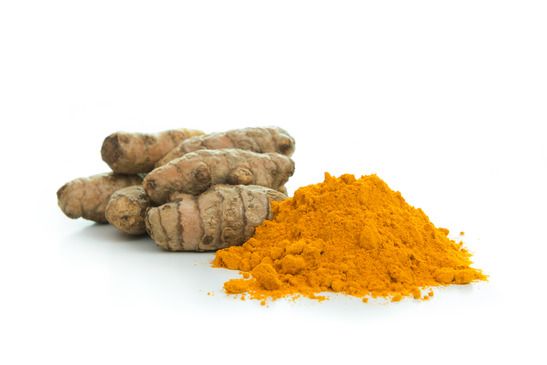The Amazing Turmeric Health Benefits
…how this widely used spice may contribute to better health and less pain!
 Turmeric, a distant cousin to ginger, is taking the world by storm. Not due to its bitter, and often, warm taste…
Turmeric, a distant cousin to ginger, is taking the world by storm. Not due to its bitter, and often, warm taste…
But due the amazing power and benefits you may see from using Turmeric. The simple fact is: The Turmeric health benefits you may see make this one of the most important spices to include daily.
Besides the culinary aspects you can get from Turmeric (like a warm, bitter taste that layers each bite you take), it has also been used for centuries in Ayurveda, for its powerful medicinal uses.
In this article, we will show you the most important Turmeric health benefits you may expect when supplementing with this powerful spice. When someone asks what is Turmeric good for--you can provide them with in-depth, researched-backed reasons why they should be including Turmeric each day.
Table of Contents
What Is Turmeric?
Turmeric Health Benefits
Turmeric Uses in Cooking and Medicine
Turmeric Side Effects
Turmeric vs. Curcumin—which is better?
Conclusion
What Is Turmeric?
You may have already heard of Turmeric before as a culinary spice used in many curry recipes. Turmeric is a spice often harvested from the Turmeric plant.
It’s commonly used in Asian recipes and Indian recipes. Although it’s often used to spice up dishes, Turmeric has also been used for centuries as a medicine in many Eastern countries.
The difference between Turmeric as a medicine and as a spice may be different. The plant is often ground up to make your favorite spice, but the root of the plant is used as a powerful medicine. The main component, and the most researched molecule contained in Turmeric, is curcumin—which gives the spice the distinctive yellow coloring.
There are many different ailments often treated with Turmeric. They include:
- Pains and inflammation (arthritis)
- Hay fever
- Depression
- High cholesterol
- A type of liver disease
- Itching
- Heartburn
- Thinking and memory issues
- IBS
- Stress
The reason why Turmeric is so powerful is due to the Curcumin. Curcumin may lower inflammation, making it extremely effective against arthritis, heart disease, diabetes, and possibly cancer.
But these are just a few of the health issues Turmeric may help with…
Turmeric Health Benefits
Turmeric is quickly gaining popularity due the anti-inflammatory compounds and effect it has on the body. It is mainly used to treat inflammatory conditions, like arthritis, but that’s only one powerful contribution it may have on your health.
Some other Turmeric health benefits include:
1. Bioactive Compounds That Improve Your Health
Turmeric contains plenty of bioactive compounds that lower inflammation and protect your cellular health.
These molecules, also called curcuminoids, act as powerful antioxidants in your body. Not only does this protect your cells from damage, it lowers chronic inflammation, therefore lowering your chronic disease risk.
Curcumin, the chief curcuminoid found in Turmeric, has been extensively researched and proven to play a large role in overall health improvements. But one note to consider about Curcumin:
It’s poorly absorbed by your body, which is why most people use black pepper (piperine) or a fat to increase absorption.
Although you may think that using Turmeric in cooking will give you enough Curcumin, it’s won’t. There is only 3% Curcumin found in a large dose of Turmeric, which may not make a dent in your overall health.
That’s why it’s often recommended to use a Turmeric supplement that is fermented for better absorption, or one that contains a high dose of Curcumin.
2. It Is Naturally Anti-Inflammatory
 In order to stay healthy, you need some level of inflammation. It protects and speeds healing when you’re injured, and it kills bacteria and viruses when you’re sick.
In order to stay healthy, you need some level of inflammation. It protects and speeds healing when you’re injured, and it kills bacteria and viruses when you’re sick.
However, when the inflammation signal fails to shut off, it destroys tissues and cells in your body, which could lead to heart disease, diabetes, cancer, metabolic syndrome, and others.
This is why you should have a diet full of fruits and vegetables, to allow the antioxidants to work to combat high inflammation levels.
Curcumin is naturally anti-inflammatory, and may be just as strong and effective at lowering inflammation as some over-the-counter medications.
It works by blocking the activity of NF-kB, a molecule that increases inflammation.
By blocking NF-kB, you may cut down on your risk for developing a number of chronic diseases.
3. Increases Antioxidant Status in Your Body
Antioxidants are extremely important molecules for your body. They help to combat oxidative stress, which may fight against free radicals and protect healthy cells.
Oxidative stress may speed up the aging process, damage healthy cells, disrupt your DNA, and cause massive damage in your body.
To control oxidative stress, you need more antioxidants—from the foods you eat, and the ones produced by your own body.
Curcumin, a powerful antioxidant, may naturally lower oxidative stress, and increase the production of antioxidant enzymes in your body.
This activity prevents oxidative stress from damaging healthy cells, which could be helpful as you age.
4. Protects Brain Health
As you get older, your brain cells start to decline, which increases your risk for age-related brain disorders including, Alzheimer’s, dementia, and Parkinson’s.
Studies show that brain-derived neurotrophic growth factor, or BDNF, has been shown to form new connections in the brain and help neurotransmitters to grow and multiply.
Curcumin may increase BDNF levels, which could reduce the risk for age-related brain disorders from occurring, and may even improve memory.
5. Protects Your Heart
Heart disease is the number one cause of death around the world. Although there are many factors that may cause heart disease, one of the most important is endothelial function.
Your endothelium, which lines your arteries, may become hard and inflexible, due to a poor diet and other factors.
This leads to high blood pressure, issues with blood clotting, and other risks. Exercise and the right diet may improve endothelial function, which is why it is often recommended you combine the two for better heart health.
However, a simple and effective way to improve endothelial function is to use more curcumin. Curcumin has been shown to reverse the process, which improves endothelial health.
In fact, Curcumin may be as effective as exercise and prescription medications.
6. Protects Against Alzheimer’s Disease
 Alzheimer’s is one of the most prevalent diseases that impacts older adults. Although there is no cure, most current treatment options only slow the progress, and may be ineffective.
Alzheimer’s is one of the most prevalent diseases that impacts older adults. Although there is no cure, most current treatment options only slow the progress, and may be ineffective.
There are many reasons why someone gets Alzheimer’s, but one main reason may be amyloid plaques in the brain.
Inflammation may also destroy brain cells, therefore increasing the risk for age-related disorders.
Curcumin may be able to cross the blood brain barrier, which could help reduce inflammation and oxidative damage to your brain cells, thanks to its antioxidant potential.
And, curcumin may clear amyloid plaques, which could reduce the risk for Alzheimer’s.
7. Protects Joints From Arthritis
There are many people who suffer from arthritis. Mostly inflammatory, arthritis often leads to pain, inflammation, and disability.
However, curcumin may reduce inflammation, which could reduce pain associated with arthritis.
For those who suffer from rheumatoid arthritis, it may be very painful to do everyday tasks. Curcumin, however, may lower inflammation, and could be as effective at reducing arthritis symptoms as some conventional treatment options.
Turmeric In Cooking and Medicine
As you already know, Turmeric has been used for centuries in ancient medicine. Not only does it possess strong antioxidant capabilities, it is anti-septic and anti-inflammatory.
Turmeric may alleviate symptoms associated with many different health issues.
Although Turmeric is often used to treat many health ailments, it is also used for cooking, and adding flavor to many different meals and drinks.
To release the curcumin from Turmeric, it is often sautéed with garlic, onions, and oil to release the aromatics from the Turmeric spice.
And since curcumin is fat soluble, it can be added to milk to make “golden” milk. This drink is used to treat a variety of ailments, including the common cold.
Turmeric is used in stews, curry dishes, and in coconut-based soups to boost the absorption of both the Turmeric and Curcumin.
Turmeric may be very powerful, but there are some side effects you should be aware of.
Turmeric Side Effects.
Although there are many health benefits from using Turmeric, there may be some side effects as well.
Many of the side effects are usually mild, they may include:
- Upset stomach
- Diarrhea
- Nausea
- Dizziness
Although these side effects are not very common, they may occur when using a very high dose of Turmeric or a product that contains high doses of curcumin.
Turmeric vs. Curcumin
You already know that Turmeric is a spice that comes from the root of the Turmeric plant.
Although there are many different compounds found in Turmeric, Curcumin is the strongest and most widely researched compound.
Curcumin makes up only 3% of the Turmeric plant, which may not be enough to elicit the health benefits you would see by using curcumin or Turmeric.
And this is why many people look for Turmeric supplements that contain a high concentration of Curcumin. But which one is better?
Turmeric and Curcumin may both help with different health ailments. However, there are certain aspects that Turmeric may be better at controlling compared to curcumin, and vice versa.
There are compounds found in Turmeric that may have both antifungal and antiseptic properties, which aren’t related to curcumin. Although curcumin does possess some antifungal properties, the best results come from using Turmeric—thanks to the other powerful compounds.
And, when it comes to prevent tumor development, Turmeric may be the better options. Curcumin may be able to slow tumor growth, Turmeric was much more effective at slow the growth compared to curcumin alone.
So which one should you use?
We recommend a highly absorbable Turmeric supplement to be your best alternative—since Turmeric also contains Curcumin. This will give you the best shot for improving health and alleviating symptoms associated with inflammation, such as arthritis, memory and concentration issues, and heart health.
Studies consistently show that a smaller dose of Turmeric may alleviate joint pain, lower inflammation, improve cholesterol levels, reduce muscle damage after exercise, and may even speed up weight loss.
In order to get the best results, you need to be sure that the Turmeric product you’re getting has been tested for potency, and is highly absorbable, or you’re just wasting your money on something that may, or may not, work.
Conclusion
Turmeric, a popular spice in cooking and in medicine, may provide many different health benefits when used every day.
The main driving force to Turmeric is the curcuminoids found in this flowering plant. Although there are many compounds that elicit health-promoting properties, curcumin may provide the most power compared to the others.
Studies consistently show Turmeric, and Curcumin may:
- Be high anti-inflammatory—which could lower inflammation levels in your body
- Increase antioxidant status—this could help your body produce more anti-inflammatory molecules, therefore reducing oxidative stress levels in the body.
- Protect brain health—may cross the blood-brain barrier, which lowers inflammation in the brain
- Protect heart health—reduces endothelial dysfunction, which could lower blood pressure and protect your heart.
- Protect against Alzheimer’s Disease—may reduce the incidence of amyloid proteins in your brain, which may be the main contributing factor for Alzheimer’s.
- Protect joints by lowering inflammation.
Before you start using Turmeric, you should note that Turmeric is not readily available to your body. In fact, your body has a hard time naturally absorbing Turmeric. You often need to combine Turmeric with pepper, or in a high-fat meal, in order to increase absorption.
And this may only slightly increase your absorption, which may not impact your health at all. This is why, if you’re looking for a Turmeric product, you need to find one that is highly-absorbable, so you can use the Turmeric to lower inflammation, improve your health, and reduce your risk for age-related health conditions.
Discover How We've Made Turmeric 10X More Absorbable Using THIS 3-Step "Releasing" Technique >>
If you found this article helpful, please SHARE with your family and friends by clicking any of the social media buttons below.
References:
1. Naopal M, Sood S. Role of curcumin in systematic and oral health: an overview. J Nat Sci Biol Med. 2013 Jan-Jul: 4(1):3-7.
2. Takada Y, Bhardwaj A, Potdar P, Aggarwal BB. Nonsteroidal anti-inflammatory agents differ in their ability to suppress NF-kappaB activation, inhibition of expression of cyclooxygenase-2 and cyclin D1, and abrogation of tumor cell proliferation. Oncogene. 2004 Dec:9(23):9247-58.
3. Biswas SK, McClure D, Jimenez LA, Megson JL, Rahman I. Curcumin induces glutathione biosynthesis and inhibits NF-kappaB activation and interleukin-8 release in alveolar epithelial cells: mechanism of free radical scavenging activity. Antioxid Redox Signal. 2005 Jan-Feb:7(1-2): 32-41.
4. Xu Y, Ku B, Tie L, Yao H, Jiang W, Ma X, Li X. Curcumin reverses the effects of chronic stress on behavior, the HPA axis, BDNF expression and phosphorylation of CREB. Brain Research. 2006 Nov 1:1122(1): 56.64.
5. Akazawa N, Choi Y, Miyaki A, Tanabe Y, Sugawara J,Ajisaka R, Maeda S. Curcumin Ingestion and exercise training improve vascular endothelial function in postmenopausal women. Nutr Res. 2012 Oct;32(10):795-9.
6. Zhang L, Fiala M, Cashman J, Sayre J, Espinosa A, Mahanian M, Zaghi J, Badmaey v, Graves MC, Barnard G, Rosenthal M. Curcuminoids enhance amyloid beta uptake by macrophages of Alzheimer’s disease patients. J Alzheimers Dis. 2006 Sep;10(1):1-7.
7. Chandran B, Goel A. A randomized, pilot study to assess the efficacy and safety of curcumin in patients with active rheumatoid arthritis. Phytother Res. 2012 Nov;26(11):19-25.
About Jayson Hunter & Jaylab Pro

Jaylab Pro was founded by Registered Dietitian Jayson Hunter. Jayson has been recognized as one of America's foremost weight loss experts by America's Premier Experts™. He has also been featured in USA Today for this accomplishment. Jayson is also a best-selling author having co-authored multiple books in health & fitness and business growth. Jayson and the Jaylab Pro team are proud to create content that helps improve the lives of millions of people around the world. We hope you enjoy it just as much as others have.
 If you order a JayLabPro SmartShip product or any Combo Package, we will automatically ship you a new supply of the product or products you have ordered every month, starting 30 days after your initial order is shipped, and continuing until you cancel. The credit card you are using today will be billed the lowest available price for those product or products when your order is shipped, but shipping will be FREE. You may log into your customer account or call our customer service department toll-free at 1-888-9GETPRO (1-888-943-8776) between the hours of 8am – 9pm EST Mon-Fri to cancel future shipments, customize the timing of your shipments, or change the credit card used for billing.
If you order a JayLabPro SmartShip product or any Combo Package, we will automatically ship you a new supply of the product or products you have ordered every month, starting 30 days after your initial order is shipped, and continuing until you cancel. The credit card you are using today will be billed the lowest available price for those product or products when your order is shipped, but shipping will be FREE. You may log into your customer account or call our customer service department toll-free at 1-888-9GETPRO (1-888-943-8776) between the hours of 8am – 9pm EST Mon-Fri to cancel future shipments, customize the timing of your shipments, or change the credit card used for billing.









